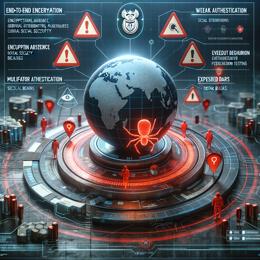Image created by AI
China Denounces Western Accusations of Global Hacking Operations
In an escalating cyber conflict landscape, China has voiced a formal protest against the allegations made by the United States and its allies, the United Kingdom and New Zealand, regarding Beijing's involvement in sophisticated cyber espionage operations. China's response arrives after detailed accusations from the Western nations linking a decade-spanning series of cyber breaches to Beijing's strategic objectives.
The contentious global hacking narrative unfolded when Washington, backed by its allies, publicly called out China for its alleged long-term cyber espionage campaign—a venture they claim serves China's economic espionage and foreign intelligence interests. Specifically implicated was a unit identified as APT31, believed to operate out of Wuhan under the auspices of the Ministry of State Security. According to the US Department of Justice, these malicious actors targeted thousands of entities, including businesses, prominent individuals, and journalists worldwide.
Moreover, the UK has taken steps to reinforce its cyber defense by sanctioning entities tied to APT31, while also summoning China's high-ranking envoy in London for a discourse of condemnation over the cyber assaults. UK officials additionally emphasize the rigorous protection measures that successfully shielded their electoral processes and legislative persons from these threats.
Across the seas, New Zealand has uncovered compromises in its own legislative infrastructure, holding the APT40 group, another entity with alleged Chinese state affiliation, responsible. Despite potential economic repercussions, New Zealand's frontrunners have shown a firm stance against the cyberattacks, underscoring the increasing Western consensus on addressing and attributing cyber threats to state-backed entities.
Amidst these allegations, China maintains its stance against cyberattacks, rebuffing claims and accusing the West, particularly the US, of fabricating and circulating disinformation. Foreign ministry spokesperson Lin Jian spoke out, insisting on China's opposition to cyber breaches and underscoring the nation's resolve to enforce measures protecting its legitimate rights and interests.
This geopolitical cyber drama lays bare the complex tapestry of international relations, where digital warfare and cyber intrusions have become extensions of state power. As tensions simmer, Western nations exhibit a growing propensity to identify and reprimand state-sponsored cyber activities, with China, Russia, North Korea, and Iran routinely spotlighted. Reinforcement of global cyber defenses and diplomatic measures are in motion, signaling a potent mix of technology and geopolitics that is reshaping the traditional diplomatic arena.










